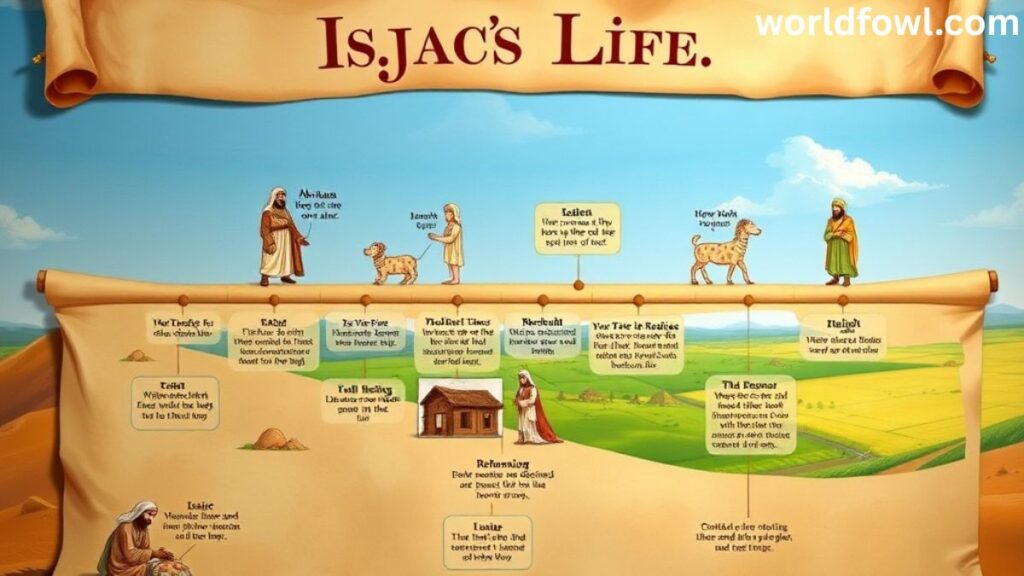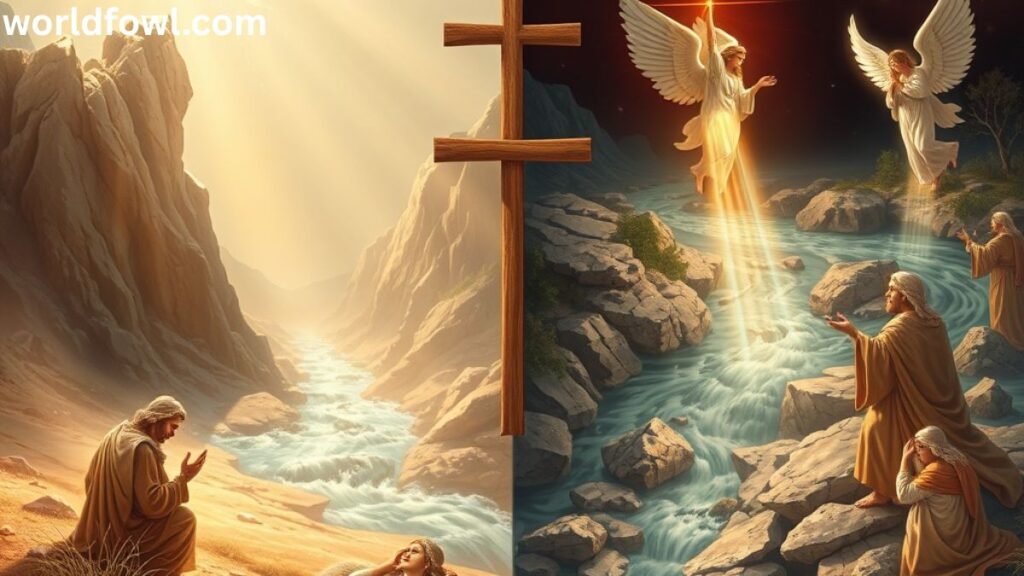The 14 Interesting Facts About Isaac from the Bible explore the life of one of Scripture’s most pivotal patriarchs. Isaac stands between Abraham and Jacob as the essential link in God’s covenant promises. His story spans miraculous birth, divine testing, answered prayers, and peaceful leadership. These facts reveal how this son of promise shaped the foundation of three major world religions.
14 Interesting Facts About Isaac from the Bible Most people know Isaac only as the child Abraham almost sacrificed. That dramatic moment barely scratches the surface. His name means laughter—born from his parents’ disbelief turned to joy. He married through supernatural guidance. He dug wells instead of waging wars. His peaceful character set him apart from every other biblical patriarch.
These 14 Interesting Facts About Isaac from the Bible uncover layers of meaning often overlooked. You’ll discover how his life foreshadowed Christ in stunning detail. You’ll see patterns of faith, patience, and divine intervention woven throughout his 180 years. Isaac’s quiet faithfulness carried God’s redemptive plan forward through generations. His story proves that ordinary obedience creates extraordinary impact in God’s hands.
Isaac’s Name Means “Laughter”
The name Isaac—or Yitzchak in Hebrew—literally translates to “he laughs” or “laughter.” This wasn’t a random choice. It carried profound meaning rooted in the circumstances of his birth.
When God promised Abraham that he’d father a child at age 100, Abraham fell on his face and laughed. Genesis 17:17 captures this moment perfectly. Sarah, his wife, also laughed when she overheard the same promise in Genesis 18:12. She was 90 years old—long past childbearing years by any human standard.
Their laughter wasn’t mockery. It expressed disbelief mixed with wonder. How could twoolder people people produce a child? Yet God chose this name as a permanent reminder that nothing’s impossible for Him. Every time someone called Isaac’s name, they proclaimed God’s power to accomplish the seemingly absurd.
The laughter that began in doubt transformed into joy. When Isaac arrived, Sarah declared in Genesis 21:6: “God has brought me laughter, and everyone who hears about this will laugh with me.” What started as skeptical laughter became celebratory laughter—a shift that defined Isaac’s entire existence.
Isaac Was Born Through God’s Promise

Isaac’s birth represents one of Scripture’s clearest examples of miraculous birth and divine promises fulfilled. He wasn’t conceived through natural human ability. He came through supernatural intervention.
Genesis 21:5 records that Abraham was exactly 100 years old when Isaac arrived. Sarah was 90. Medical science confirms what ancient people instinctively knew—conception at that age defies natural law. Yet this impossibility served God’s purpose perfectly.
| Aspect | Details |
|---|---|
| Father’s Age | 100 years old |
| Mother’s Age | 90 years old |
| Years of Waiting | 25 years from initial promise |
| Purpose | Establish God’s covenant with Abraham’s descendants |
The Abrahamic covenant required a legitimate heir. God had promised Abraham descendants as numerous as stars in the sky. But year after year passed with no child. Abraham even tried taking matters into his own hands through Hagar, producing Ishmael. But God said no—the promised child would come through Sarah.
This waiting period tested Abraham and Sarah’s faith. They had to trust God’s timing even when circumstances screamed impossibility. Isaac’s eventual arrival proved that God’s promises don’t depend on human capability. They depend solely on His faithfulness.
The covenant fulfillment through Isaac established a pattern repeated throughout Scripture. God often works through impossible situations to demonstrate His power. He chose the barren, the weak, and the unlikely to accomplish His purposes.
Abraham Almost Sacrificed Isaac
Perhaps no episode in Isaac’s life carries more weight than the events at Mount Moriah recorded in Genesis 22:2. God commanded Abraham to sacrifice his beloved son—the very child through whom all God’s promises were supposed to flow.
This test pushed faith and obedience to their absolute limits. Abraham faced an impossible dilemma. Obeying God meant destroying the fulfillment of God’s own promise. How could Isaac father nations if he died on an altar?
Yet Abraham didn’t hesitate. Early the next morning, he gathered wood, took Isaac, and traveled three days to the designated mountain. The journey gave him plenty of time to reconsider. He never wavered.
When Isaac asked where the lamb for sacrifice was, Abraham gave a prophetic answer: “God will provide for himself the lamb for a burnt offering, my son.” This statement proved truer than Abraham likely realized at the moment.
The Symbolism Runs Deep
The sacrifice symbolism in this account foreshadows Christ in stunning detail:
- Both were beloved sons of their fathers
- Both carried the wood for their own sacrifice (Isaac carried firewood; Jesus carried the cross)
- Both willingly submitted to their father’s will
- Both were “sacrificed” on the same geographical location (Mount Moriah became the site of Solomon’s Temple and, later, Golgotha)
- Both represented God’s provision for redemption
At the critical moment, God stopped Abraham’s hand. A ram caught in a thicket became the substitute sacrifice. This divine intervention saved Isaac’s life and demonstrated that God never intended child sacrifice. He wanted Abraham’s heart—his complete willingness to surrender everything.
The site’s name, “The LORD Will Provide” (Jehovah Jireh), echoes through salvation history. God’s provision at that mountain pointed forward to ultimate provision—His own Son sacrificed for humanity’s redemption.
Isaac Married Rebekah Through Divine Intervention

Isaac’s marriage story showcases divine guidance in remarkable fashion. Unlike many biblical marriages arranged through family negotiations, Isaac’s union with Rebekah involved clear supernatural direction.
Abraham refused to let Isaac marry a Canaanite woman. He wanted his son connected to their ancestral homeland and faith community. So he sent his most trusted servant on a mission to find the right wife.
Genesis 24:12–14 records the servant’s specific prayer. He asked God for a clear sign—the woman who offered water to both him and his camels would be the chosen one. This wasn’t a small request. Camels drink enormous amounts of water after traveling. Drawing enough water for ten camels meant serious physical labor.
Before he finished praying, Rebekah appeared. She fulfilled the sign exactly. When asked, she volunteered to water all the camels without knowing about the servant’s prayer. Her generous spirit and work ethic revealed her character immediately.
Key Elements of Their Meeting
The divine intervention in this story included several striking details:
- Perfect timing – Rebekah arrived at precisely the right moment
- Unexpected generosity – She went beyond what was asked
- Family connection – She turned out to be Abraham’s great-niece
- Immediate confirmation – The servant recognized God’s answer instantly
- Willing heart – Rebekah agreed to leave her family and marry a man she’d never met
When Rebekah finally met Isaac, he was meditating in a field at evening time. Their first encounter carried a sense of destiny. Genesis 24:67 notes that Isaac loved Rebekah and found comfort through her after his mother Sarah’s death.
This arranged marriage worked because God orchestrated it. Isaac didn’t choose based on physical attraction or personal chemistry. He trusted his father’s wisdom and God’s guidance. The result was a partnership that would produce the next generation of biblical patriarchs.
Isaac Prayed for His Wife to Have Children
Despite being the miracle child himself, Isaac faced the same challenge his parents endured—barrenness. Rebekah couldn’t conceive. For twenty years, their marriage remained childless.
Many men might have taken a second wife or concubine, following cultural norms. Isaac didn’t. Instead, he demonstrated trust in God through intercessory prayer. Genesis 25:21 records that “Isaac prayed to the LORD on behalf of his wife, because she was childless.”
This simple statement reveals Isaac’s spiritual legacy and character. He understood that children came as gifts from God, not merely through biological processes. His own miraculous birth taught him that God controlled the womb.
The Power of Persistent Prayer
Isaac’s prayer life offers several lessons:
- He prayed specifically – He didn’t pray vaguely for blessings but addressed the exact problem
- He prayed persistently – Twenty years represents serious dedication
- He prayed for his wife – He interceded on Rebekah’s behalf, not just his own desire for an heir
- He trusted God’s timing – He didn’t manipulate circumstances or force alternative solutions
- He received God’s answer – The LORD answered his prayer, and Rebekah conceived
When Rebekah finally became pregnant, she carried twin sons—Jacob and Esau. God told her in Genesis 25:23 that two nations were in her womb and the older would serve the younger. This prophecy set in motion events that shaped Middle Eastern history for millennia.
The contrast between Isaac’s patient prayer and Abraham’s earlier impatience with Hagar highlights Isaac’s mature faith. He learned from his father’s mistakes and chose a better path.
Isaac Was Known for His Peaceful Nature

Among the patriarchal lineage, Isaac stands out for his remarkably peaceful character. While Abraham was a wandering pioneer and Jacob became a cunning negotiator, Isaac preferred avoiding conflict.
This trait shone brightest during disputes over wells. In ancient Near Eastern culture, water sources meant survival. Control over wells determined wealth and power. Yet when herdsmen contested Isaac’s wells, he consistently backed down.
Genesis 26:19–22 narrates three separate well disputes:
| Well Name | Meaning | Isaac’s Response |
|---|---|---|
| Esek | “Dispute” | He moved on when challenged |
| Sitnah | “Opposition” | He moved again without fighting |
| Rehoboth | “Room” | Finally found uncontested space |
After two conflicts, Isaac could have reasonably stood his ground. He had the resources and manpower. Instead, he chose peace. His willingness to relocate rather than fight demonstrated extraordinary patience and faith in God’s provision.
The Blessing of Peacemaking
Isaac’s peaceful approach paid off. Each time he moved, he found new water sources. When he finally reached Rehoboth, he declared, “Now the LORD has given us room and we will flourish in the land.”
His peaceful nature also appeared in:
- Accepting his father’s choice of wife without complaint
- Allowing Esau’s marriages despite his disapproval (showing he didn’t control his adult children)
- Eventually blessing both sons despite their rivalry
- Maintaining relationships with neighbors even when tensions existed
Some might interpret Isaac’s peacefulness as weakness. Biblical writers saw it differently. They portrayed a man secure enough in God’s promises that he didn’t need to grasp or fight. He trusted that God would defend and provide.
This peaceful disposition made Isaac an effective spiritual leader during his era. He mediated rather than dominated. He preferred harmony over victory.
Isaac Had a Close Relationship with God
Though quieter than his father Abraham’s dramatic encounters, Isaac’s spiritual heritage included genuine communion with God. He wasn’t just coasting on his father’s faith—he developed his own relationship with the divine.
Genesis 26:24 records a pivotal moment when God appeared to Isaac directly: “I am the God of your father Abraham. Do not be afraid, for I am with you; I will bless you and will increase the number of your descendants for the sake of my servant Abraham.”
This encounter happened during a difficult time. Famine had struck the land, and Isaac faced pressure to move to Egypt. God’s appearance provided both comfort and direction. The message confirmed that God’s covenant extended to Isaac personally, not just through inheritance.
Evidence of Isaac’s Faith

Several actions demonstrate Isaac’s genuine faith:
- Building altars – Genesis records Isaac building altars and calling on God’s name
- Receiving visions – God spoke to him directly, as He had to Abraham
- Practicing hospitality – He showed generosity to strangers, reflecting his spiritual values
- Meditating – He spent time alone in fields, suggesting a contemplative spiritual life
- Passing on faith – He taught his sons about God, though their responses differed
Unlike Abraham, who left his homeland to follow God, or Jacob, who wrestled with God, Isaac lived a more settled existence. Yet this stability allowed him to maintain consistent spiritual practices that deepened his connection to God.
His prayers weren’t just crisis-driven. He cultivated ongoing communication with God throughout his life. This steady faithfulness made him an essential link in covenantal theology—the bridge between Abraham’s pioneering faith and Jacob’s transformative struggles.
Isaac’s Sons, Jacob and Esau, Became the Fathers of Two Nations
The birth of Isaac’s twin sons fulfilled God’s promise about multiplying Abraham’s descendants. But it also created a complicated family dynamic that shaped ancient Near Eastern politics for centuries.
Jacob and Esau were fraternal twins, but couldn’t have been more different. Esau emerged first, red and hairy. Jacob followed, grasping Esau’s heel—a detail that foreshadowed their lifelong rivalry.
Esau became a skillful hunter who loved the outdoors. Jacob preferred staying near the tents. Isaac favored Esau, while Rebekah favored Jacob. This parental favoritism poisoned their family relationships and led to devastating consequences.
Two Nations Diverge
The Israelites and Edomites descended from these brothers:
| Aspect | Jacob (Israel) | Esau (Edom) |
|---|---|---|
| Descendants | Twelve cohorts of Israel | Edomite nation |
| Territory | Canaan/Promised Land | Mount Seir/Petra region |
| Relationship | Chosen lineage for Messiah | Perpetual tension with Israel |
| Biblical Role | Covenant carriers | Often Israel’s adversaries |
| Historical Outcome | Jewish people | Edomites eventually absorbed |
The prophecy in Genesis 25:23—”the older will serve the younger”—violated ancient customs where firstborns received primary inheritance and blessing. Yet it proved accurate. Jacob received the birthright and blessing through deception, sparking centuries of conflict between the ancestral nations.
Esau’s decision to sell his birthright for a bowl of stew revealed his priorities. He valued immediate physical satisfaction over long-term spiritual inheritance. This choice had consequences beyond his personal life—it determined his descendants’ place in God’s plan.
Jacob’s deception to steal Esau’s blessing showed his flawed character. Yet God chose him anyway, demonstrating that divine selection doesn’t depend on human perfection. God works through broken people to accomplish His purposes.
The brothers eventually reconciled years later when Jacob returned from Laban’s household. Their tearful reunion showed that forgiveness was possible even after deep betrayal. However, their nations continued an uneasy relationship throughout biblical history.
Isaac Lived a Long Life

Longevity marked Isaac’s earthly journey. Genesis 35:28–29 records that he lived 180 years—longer than his father Abraham (175 years) though not as long as his grandfather Terah (205 years).
This extended lifespan meant Isaac witnessed multiple generations. He saw his grandsons born and likely knew some great-grandchildren. He lived through Jacob’s departure to Laban, his return, and the early years of Joseph’s life.
Timeline of Isaac’s Life
Breaking down his 180 years reveals fascinating patterns:
- Birth to marriage: 40 years of being Abraham’s son and heir
- Marriage to twins’ birth: 20 years of praying for children
- Raising Jacob and Esau: Approximately 60+ years of active parenting
- Later years: Nearly 80 years after Jacob received his blessing
Interestingly, Isaac’s eyesight failed in his later years—a detail that enabled Jacob’s successful deception. This physical decline didn’t indicate spiritual weakness. It simply showed he experienced normal aging processes.
The Bible suggests Isaac remained relatively passive in his final decades. Jacob and Esau’s reunion occurred at their father’s deathbed, suggesting he served as a unifying figure even when physically weak. Both sons came together to bury him, demonstrating respect despite their troubled history.
Isaac’s long life allowed him to fulfill his role as a transitional patriarch. He carried Abraham’s legacy forward and prepared the way for Jacob’s transformation into Israel. His steady presence provided continuity during a critical period in salvation history.
Isaac Is a Symbol of Jesus in Christian Theology
Christian theology recognizes Isaac as one of Scripture’s clearest typological symbols pointing to Christ. The parallels between Isaac’s experiences and Jesus’s mission create what theologians call Messianic foreshadowing.
The sacrifice symbolism at Mount Moriah provides the most obvious connection. Like Isaac, Jesus was the beloved son. Like Isaac, Jesus submitted willingly to his father’s plan.
Theological Parallels

The connections extend beyond the obvious:
Promise and Fulfillment Isaac arrived as the promised child through miraculous means. Jesus came as the ultimate fulfillment of messianic prophecies through virgin birth. Both represented God’s intervention in human impossibility.
Substitute Sacrifice At the critical moment, a ram replaced Isaac on the altar. Jesus became the ultimate substitutionary sacrifice—the “Lamb of God who takes away the sin of the world.” What Abraham couldn’t complete, God the Father did through His own Son.
Resurrection Symbol Jewish commentary notes that Isaac was “as good as dead” during the three-day journey to Mount Moriah. When God stopped the sacrifice, it symbolized Isaac returning from death. Jesus literally died and rose on the third day.
Heir of Everything Abraham gave everything he owned to Isaac (Genesis 25:5). God gave all authority to Jesus, who inherits all things.
Bridegroom Figure Isaac’s marriage to Rebekah—chosen by the father and brought by a faithful servant—parallels Christ and the Church. The Holy Spirit brings believers to Christ, chosen before the foundation of the world.
Why This Matters
Understanding Isaac as a type of Christ enriches both Old and New Testament reading. It reveals the Bible’s unified narrative of redemption spanning thousands of years. God wasn’t improvising—He was unfolding a carefully designed plan.
The writer of Hebrews explicitly connects these dots: “Abraham reasoned that God could even raise the dead, and so in a manner of speaking he did receive Isaac back from death” (Hebrews 11:19). This figurative resurrection pointed toward the literal resurrection that would change everything.
Early church fathers saw these connections clearly. Irenaeus wrote in the second century that Isaac “carried the wood of his own sacrifice” just as Christ carried His cross. Tertullian noted that both sacrifices occurred at the same location, demonstrating God’s consistent redemptive geography.
Modern Old Testament theology continues exploring these parallels. Scholars recognize that the ancient Israelites may not have fully understood how their stories pointed forward. Yet the Holy Spirit embedded these prophetic patterns throughout Scripture for later revelation.
The Lasting Impact of Isaac’s Life
Isaac’s story might seem quieter than other biblical patriarchs, but his significance can’t be overstated. He provided essential continuity in God’s redemptive plan.
Without Isaac, Abraham’s promises die unfulfilled. Without Isaac, there’s no Jacob—no Israel, no twelve cohorts, no David, no prophets, and ultimately no Jesus. The entire biblical narrative depends on this son of promise who lived faithfully between two more dramatic figures.
His name appears repeatedly in Scripture’s most important formulations. God identifies Himself as “the God of Abraham, Isaac, and Jacob.” This triple identification establishes covenant continuity across generations. It shows that God’s faithfulness doesn’t depend on one person’s faith—it extends through families and across time.
Lessons From Isaac’s Character

Modern readers can draw several principles from Isaac’s life:
Patient Faith Isaac waited twenty years for children. He didn’t manipulate circumstances or force solutions. His patience teaches us that God’s timing differs from ours, but His timing is perfect.
Peaceful Resolution In our conflict-driven culture, Isaac’s willingness to walk away from disputes offers counter-cultural wisdom. Sometimes the strongest choice is releasing our “rights” and trusting God’s provision elsewhere.
Generational Blessing Isaac received blessing from his father and passed it to his sons. He understood his role as a link in a longer chain. We’re all transitional figures—receiving from those before us and investing in those who follow.
Simple Obedience Isaac wasn’t a theological genius or charismatic leader. He simply walked faithfully with God day after day. Sometimes God calls us to quiet faithfulness rather than dramatic acts.
Divine Partnership From his miraculous conception to his lengthy life, Isaac’s story reveals God’s active involvement in human lives. He doesn’t just wind up the universe and step back—He engages personally with His people.
Conclusion
These 14 interesting facts about Isaac from the Bible reveal a man whose quiet faithfulness shaped history. He wasn’t flashy or dramatic. He simply trusted God’s promises day after day.14 Interesting Facts About Isaac from the Bible From his miraculous birth to his peaceful character, Isaac showed that ordinary obedience matters deeply. 14 Interesting Facts About Isaac from the Bible His story connects Abraham’s pioneering faith to Jacob’s transformative journey. Without Isaac, God’s covenant couldn’t continue.14 Interesting Facts About Isaac from the Bible His life proves that you don’t need spectacular moments to make a lasting impact.
Understanding these 14 interesting facts about Isaac from the Bible enriches your entire Scripture reading. You see patterns pointing toward Christ. You notice God’s faithfulness across generations. Isaac’s willingness to be sacrificed foreshadowed Jesus’s ultimate sacrifice. His patient prayers demonstrate trust in God’s timing. His peaceful nature shows strength through surrender. Isaac reminds us that God writes powerful stories through willing hearts. His laughter-filled name still echoes today—celebrating God’s impossible promises fulfilled.








